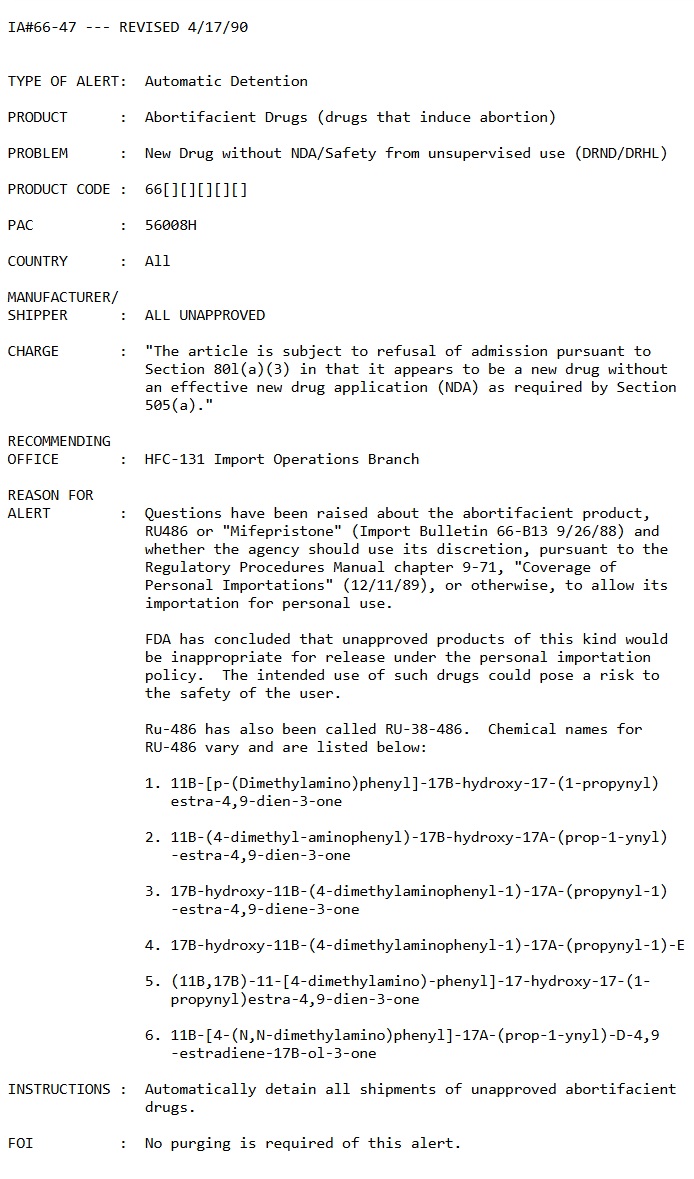Senator Josh Hawley (R-Mo.) has introduced the Restoring Safeguards for Dangerous Abortion Drugs Act to “reinstate safety regulations on the chemical abortion drug mifepristone,” according to the Senator’s press release. The legislation would also prohibit importation of abortion drugs and enable women harmed by the abortion pill to sue for both physical and emotional distress.
The proposal follows a move by the Trump DOJ to dismiss an important abortion pill lawsuit — something Sen. Hawley called a ‘mistake.”
Today I’m calling on the Justice Department to reverse their defense of Joe Biden’s abortion policy. DOJ should be supporting Missouri’s case to put safety limits on abortion drugs pic.twitter.com/re1OagDPtQ
— Josh Hawley (@HawleyMO) May 7, 2025
Hawley’s Legislation
Sen. Hawley’s proposal seeks to remedy changes made to the abortion pill’s safety protocols; it would “require the Secretary of Health and Human Services to approve a risk evaluation and mitigation strategy for mifepristone that is identical to the strategy previously approved, and for other purposes.”
The bill would require the following:
Not later than 90 days after the date of enactment of this Act, the Secretary of Health and Human Services shall: (1) withdraw approval of the risk evaluation and mitigation strategy pursuant to section 505–1 of the Federal Food, Drug, and Cosmetic Act (21 U.S.C. 355–1) for the covered medication that is in effect on the date of enactment of this Act; and (2) approve a risk evaluation and mitigation strategy for the covered medication that is identical to the risk evaluation and mitigation strategy for such covered medication that was approved by such Secretary in June 2011.
The legislation seeks to hold a “telehealth provider, pharmacy, or any other person who knowingly imports or transports a covered medication in interstate or foreign commerce in violation of section 1462 of title 18, United States Code [otherwise known as the Comstock Act]… liable… to any individual who suffers bodily injury or harm to mental health (including any physical, psychological, emotional, or physiological harm) that is attributable, in whole or in part, to the individual’s use” of the abortion pill.
In addition, “An individual who suffers bodily injury or harm to mental health” attributable to the abortion pill may file a private right of action and “bring a civil action against the covered entity in an appropriate district court of the United States or a State court of competent jurisdiction for—(1) compensatory damages; (2) punitive damages; and (3) attorney’s fees and costs,” the proposal states.
Last month, Hawley “sent a letter to FDA Commissioner Marty Makary, directing his attention to the new mifepristone study…and urging action to reinstate safeguards,” his office stated.
I’m calling on the FDA to reinstate safety regulations on the chemical abortion drug immediately. New data out today show a massive number of severe medical side effects pic.twitter.com/mimdopobrG
— Josh Hawley (@HawleyMO) April 28, 2025
FDA’s REMS Safety Requirements
Shortly after the abortion pill was approved in 2000, the reporting of deaths began, causing the manufacturer to issue letters of warning to health care professionals. The cause of the deaths and ensuing adverse events drew concerns from the U.S. Food and Drug Administration (FDA). By April 2011, the FDA had reported over 2,200 adverse effects and post-marketing reports showed 14 women’s deaths*, 612 hospitalizations, 339 blood transfusions, and several hundred reported cases of infection — some severe — related to the abortion pill mifepristone (200mg).
It was in this year that the FDA determined a REMS (Risk Evaluation and Mitigation Strategy), was necessary for mifepristone. The FDA defines this as “a drug safety program that the U.S. Food and Drug Administration (FDA) can require for certain medications with serious safety concerns to help ensure the benefits of the medication outweigh its risks,” which “are designed to reinforce medication use behaviors and actions that support the safe use of that medication.”
While all medications have labeling that informs health care stakeholders about medication risks,” the FDA says, “only a few medications require a REMS.”
In 2016, the Obama administration FDA weakened the REMS by removing two requirements: 1) that the drug be taken in front of a clinician in-person at the location of a certified prescriber, and 2) that the manufacturer report the drug’s non-fatal adverse events (complications). The drug’s allowed use was also extended for use on preborn children up to 10 weeks (70 days) of pregnancy.
In 2020, the abortion industry rolled out a ‘no-test‘ abortion pill protocol, removing the requirement for pre-abortion labs, testing, and bloodwork needed to accurately date a pregnancy and rule out potentially fatal ectopic pregnancies. Rapid expansion of the abortion pill continued in the following years, with the abortion industry openly flouting FDA gestational limits and safety regulations and encouraging women to lie to ERs about their abortion pill complications.
In April 2021, under the guise of the COVID-19 pandemic, the Biden administration FDA expanded the REMS and temporarily enabled abortion pill distribution by mail-order pharmacy distribution. By December 2021, the Biden FDA had further weakened the REMS by eliminating the in-person dispensing requirement and allowing the drug to be permanently shipped by mail.
The Biden FDA further gutted the REMS in January 2023, allowing retail pharmacies to dispense the drug. According to the FDA, between 2000 and December 2024, “approximately 7.5 million women” used the drug to end preborn babies’ lives. In addition, 36 deaths* of women associated with the drug were also reported.
Banning Import of the Drug
Hawley’s proposal seeks to amend “Section 801 of the Federal Food, Drug, and Cosmetic Act (21 U.S.C. 381) by inserting mifepristone, and adding that “Notwithstanding any other provision of law, no person may import the drug mifepristone into the United States, including by mailing such drug to individuals.’’
Prior to Roe v. Wade, abortion advocates portrayed so-called self-abortions as dangerous. But once Big Abortion began toying with the idea of ‘no-test’ abortion pill protocols and mail-order telabortion schemes (including an over-the-counter abortion pill push), suddenly, self-managed abortion became “safe.” Today, Big Abortion is unconcerned about the harms of self-managed abortions, keeping silent as underground abortion pill vigilantes and ‘shadow networks‘ assemble abortion pills stored on ping-pong tables in basements, where they could be laced with harmful substances, and import them into the U.S.
Groups like Aid Access openly imported abortion pills into the U.S. through India without FDA approval, and in 2019, the FDA issued the group a warning letter to cease shipments — but, until recently, this went ignored. Live Action News previously documented how the Gates-funded DKT International, which sells millions of abortion pills globally, may be shipping abortion drugs into the U.S., manufactured by the Delhi-based Synokem Pharmaceuticals Ltd — alleged to have a “shoddy quality record,” according to Bloomberg.
Hawley’s proposal seeks to end this deliberate violation of FDA safety regulations by banning the import of unapproved abortion drugs into the U.S. This is not a new concept; the drug was on the prohibited import list (Import Alert 66-47) around the time of its U.S. approval.
“Questions have been raised about the abortifacient product, RU486 or ‘Mifepristone’ (Import Bulletin 66-B13 9/26/88) and whether the agency should use its discretion, pursuant to the Regulatory Procedures Manual chapter 9-71, ‘Coverage of Personal Importations’ (12/11/89), or otherwise, to allow its importation for personal use,” the original import ban seen in the image below stated. “… The intended use of such drugs could pose a risk to the safety of the user… Automatically detain all shipments of unapproved abortifacient drugs,” the ban stated at that time.

FDA Import Ban on abortion pill RU486 1980s
Reactions
Medical malpractice attorney Michael Seibel, who successfully sued the infamous serial abortionist Curtis Boyd after the abortion-related death of patient Keisha Atkins, praised Hawley’s move.
“This bill will finally give relief to the millions of women suffering the emotional effects from seeing their baby after an abortion,” Seibel told Live Action News, adding that this proposal would also “give private attorneys an enforcement provision against the abortion industry which understates the extreme psychological risk of the chemical abortion pill.”
Removing in-person dispensing of the abortion pill has placed all responsibility onto the woman to play the role of doctor, nurse, and pathologist. Today, women report experiencing excruciating pain and being traumatized when witnessing the bodies of their dead babies in the toilet after self-managed abortions. In addition, a wrongful death lawsuit filed in the State of Nevada after a 24-year-old mother allegedly died from a ‘septic abortion’ just days after obtaining the abortion pill at Planned Parenthood, revealed how harmful taking these drugs can be on women.
Abortion drugs are intended to violently end the lives of innocent babies. In February of 2025, the Guttmacher Institute estimated that in 2023, 648,500 abortion pill abortions were committed in states which legally permitted them. This translates to at least 54,042 preborn lives lost to abortion pills monthly, 1,777 daily, 74 hourly, and one every 49 seconds.
*The FDA has received reports of serious adverse events in patients who took mifepristone. As of December 31, 2024, there were 36 reports of deaths in patients associated with mifepristone since the product was approved in September 2000. These events cannot with certainty be causally attributed to mifepristone because of information gaps about patient health status, clinical management of the patient, concurrent drug use, and other possible medical or surgical treatments and conditions.








